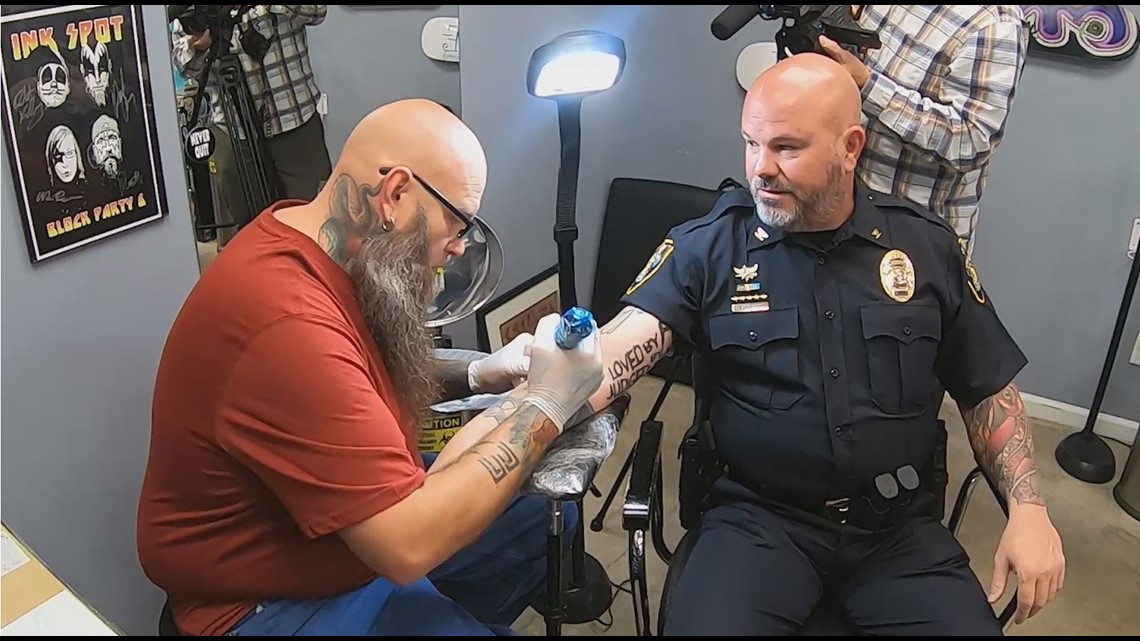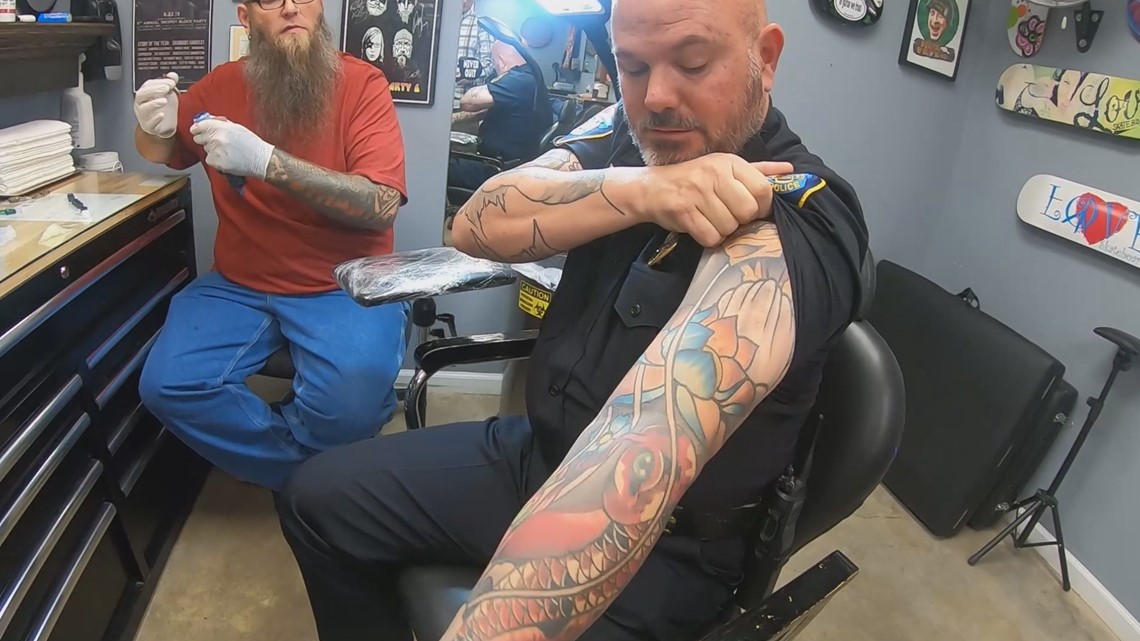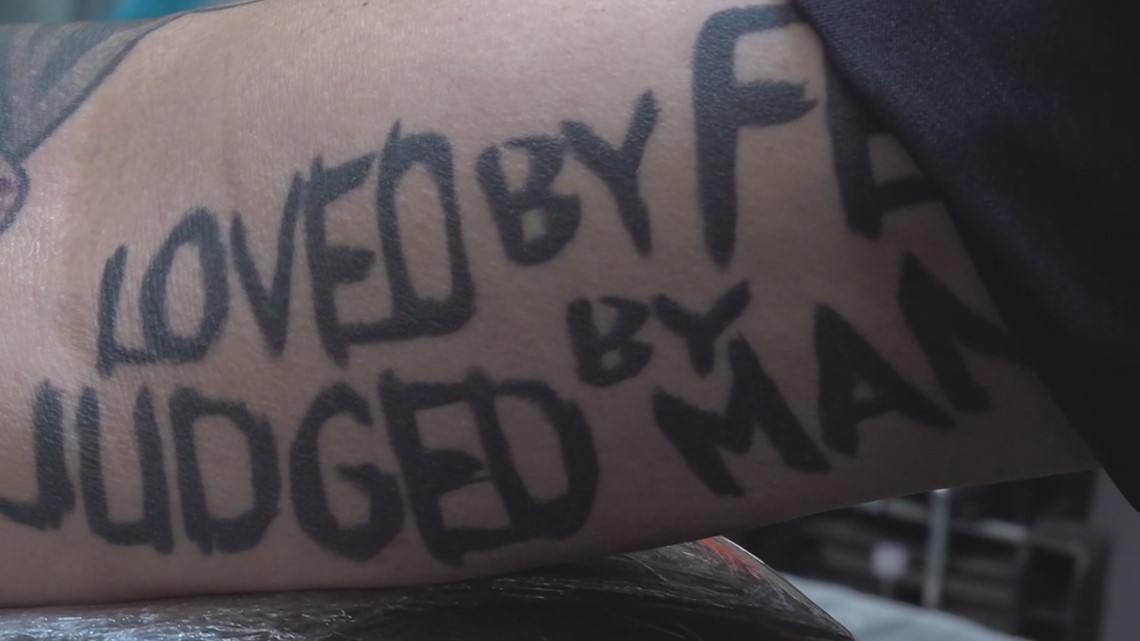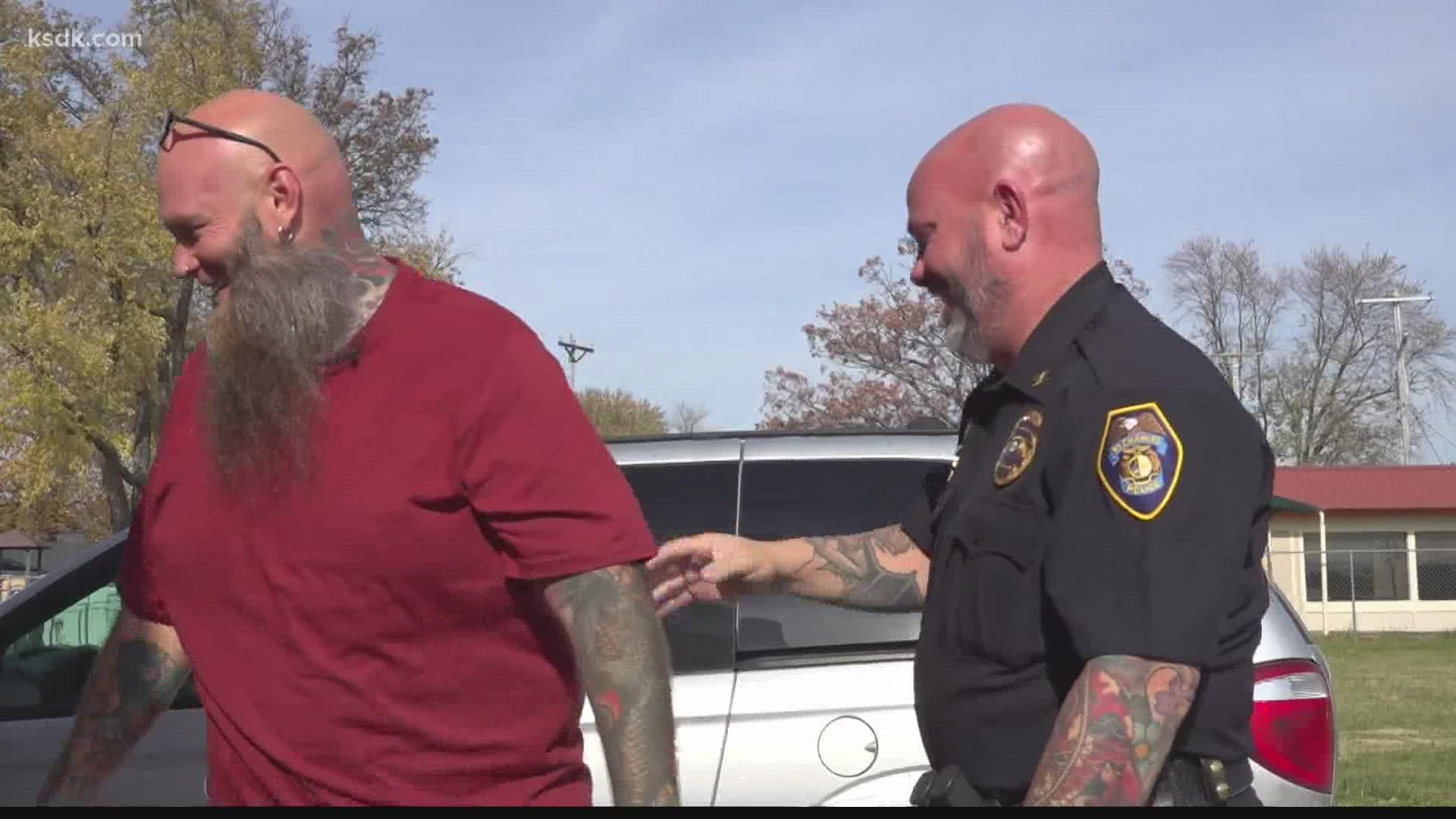LINCOLN COUNTY, Mo. — When St. Charles Police Chief Ray Juengst was just a newly-minted, fresh-faced detective in the narcotics unit, taking down guys like David “Big Dave” Canoy could really help him make a name for himself.
Canoy was one of the players during the height of the homemade meth lab game in Lincoln County.
“The people he was dealing with, I was chasing after,” Juengst said.
Now, about 20 years and a prison stint later, Canoy and Juengst have formed one of the most unorthodox friendships.
Canoy is at a place in his life he never thought possible — owning his own business, a tattoo shop. He has celebrities interested in his work, cops he once ran from like Juengst as his clients and is known for giving back to the community.
“Traditionally, people that go through that don't want to necessarily deal with cops ever again, and here we are,” Juengst said, as he sat in Canoy’s chair one recent afternoon getting more detail added to a full sleeve tattoo Canoy tattooed on his right arm. “He's probably the best human being that I know. Hands down.”


It’s a relationship that fulfills both men in different ways.
For Canoy, maintaining relationships with those on the right side of the law helps keep him grounded.
“Back then, the police were the enemy, and they were just not the people that I've surrounded myself with at all,” Canoy said. “So today, I have several law enforcement friends that are really close friends that I know that I can count on.”
For Juengst, Canoy reminds him about why he got into law enforcement.
“Bad guys get locked up and most of them don't take the opportunities they have to change like he did,” Junegst said. “So I'd do anything for him now.
“He is the reason why it's supposed to work the way it does. He's an example of it.”
The wrong direction
Canoy grew up as one of seven kids.
His father worked for a copy machine company, so there were reams of paper his father used to test machines around his house all the time. Canoy said he spent hours as a child drawing on the mostly-blank sheets of paper.
He spent the early part of his childhood in St. Louis, but his family soon moved to rural Lincoln County.
He started hanging out in tattoo shops at 15.
“I just wanted to hang around artists, but I never did want to tattoo because I was scared of working with the public," he said. "And with blood, there’s no erasers."
The move to the more rural community from the city wasn’t an easy adjustment for Canoy.
“Those are two completely different environments,” Canoy recalled. “And I didn’t seem to fit in either one of those places.”
So, he started to become the people he was around.
“You have to become a chameleon,” he said. “I created this person that I didn't even know who I really was.”
At 17, he said his parents kicked him out.
He got arrested and convicted of felony stealing after he said a group of his friends stole a car stereo. He was given probation for the felony conviction.
“I found myself just having to take care of myself in whatever way I knew how,” he said. “I was stealing and working and just living, and drugs and alcohol became a huge part of my life and a huge part of my everyday coping methods, and eventually got me to manufacturing meth.”
‘I wanted to start over’
It wasn’t long before the narcotics unit Juengst worked for started picking off members of Canoy’s circle.
“Everybody around me ended up getting arrested and I fled the state and stayed on the run for about a year,” he said. “And I finally turned myself in just because I wanted to.
“I wanted to start over. I didn't want to run anymore.”
He was charged with sales to an undercover officer and possession of methamphetamine. Ultimately, he pleaded guilty to possession of marijuana.
“My lawyer told me it looked better to be a drug user and not a drug dealer,” he recalled.
The arrest revoked his parole from the stealing charge he caught as a teenager, so he went to the county jail for about nine months and on to prison in Fulton. There, he was offered a 128-day drug treatment program.
“If I would have went to prison for what I actually did, I would still be in prison today,” he said. “I’m very blessed.”
The experience changed him.
He said he found himself among incredible, but wasted, potential.
“I really believe that most of our leaders are incarcerated,” he said. “Criminals have such leadership skills, just pointed in the wrong direction.
“They're the ones who are willing to risk. They're willing to go all in. If they have an idea, they are going to gamble everything. They will run, they will chase, they will fight, they will give up everything and sacrifice everything for something. They're just operating from a theory that doesn't work. Once somebody gave me a theory that worked, I just got my course corrected. I'm still that same person, just in a direction that works and fits into society and serves me and the people in my life.”
It was also a sobering experience for him — one that still resonates today.
“Being able to open up refrigerator and getting something cold to drink, also being able to shower by yourself, those things today I'm grateful for still years and years later, and it was because they were taken from me,” he said.
Canoy is also open about this past.
“It's just way easier,” he said. “I don't have to keep track of all the lies. I get to be authentic, and that's priceless.”
A new chapter
Not long after his release, he went through a divorce and said he lost a commercial cleaning business he had launched in the process.
He decided he wanted to do something with art, and tattooing was about the only artistic industry in which Canoy said he believed he could make a living.
In 2006, he opened his own shop.
“I didn’t want to be in the tattoo industry, which is known for drugs and partying,” he said. “I had several offers to work at shops, but I knew I wanted to open my own shop where I could regulate the environment.
“There are several people who are in recovery in our shop and the atmosphere is a lot different. You can walk in, the people are friendly, there’s not vulgarity and nakedness on the walls. Not that it’s not a tattoo shop, it’s just pretty welcoming for anybody.”
Pictures of the time he’s spent working on celebrities including comedian David Chappelle’s crew and the band Shine Down greet customers at the front door.
He and three of his friends also produced a series on YouTube dubbed Tattoos and Turnpikes in 2020 in which they spent 21 days on the road to find out what life is like in tattoo parlors and motorcycle shops across the United States. Last year, the series won an award in the Online Series – Education & Discovery category during the 42nd annual Telly Awards.
“I really never saw this life as even a possibility, “ he said. “So, I have a real hard time describing my life to people, and sometimes I feel really guilty sharing with people that do not share the same experience in life that I have.”
In the fall, Canoy sponsors and plans a free community festival called the Ink Spot Block Party with live music, children’s activities, face painting and food.
It always takes place in Lincoln County, but the locations vary. This year will be the 11th annual event – although it was canceled in 2020 due to COVID. The biggest festival had 21 bands.
“It’s a way for us to give back to the community,” Canoy said.
It’s an event that’s always on Juengst’s calendar. It's where he and Canoy reconnected about six years ago.
Canoy has been tattooing on Juengst's arms ever since. They're almost entirely covered in Canoy's ink. All Juengst gave Canoy were concepts.
"I sat down with him and gave him an idea of what I wanted and he just went to town," Juengst said.
To represent the adversity Juengst said he has faced in life, Canoy designed a koi fish that looks as if it is swimming up Juenst's arm in a yellow river.
"The story behind it is koi fishes swam up the Yellow River and spent a thousand years trying to get through the Dragons Gate," Juengst said. "Most of them gave up and turned and went back downstream.
"One koi fish, however, made it through the Dragon Gate, and after he made it through the dragon's gate, the gods rewarded him and made him a koi dragon. And he spent all of eternity picking up pearls of wisdom. So for me, the koi fish represents a lot of things that I've been through in my life."


Canoy also dotted the koi fish design with cherry blossoms, which represent the chief's children. A Lotus flower represents his wife, who gave him all of his children.
On his other arm, Canoy tattooed a large portrait of St. Michael above Lucifer.
"St. Michael is the patron saint of law enforcement, and this is the scene where he casts Lucifer out of heaven," Juengst said.
The words, "Loved by few, judged by many," line the inner part of his right bicep.


"That's personal because of what I do for a living," Juengst said. "Most people judge us by what we do for a living as opposed to truly getting to know us."
Canoy knows the feeling.
That's why Juengst is most comfortable in his chair.
“When people get in trouble and they realize it and they take that opportunity to change their life and actually truly change their life, how can you not want to be around that?” Juengst said. “How can you not want to be part of that or help them in any way?
“That's what we got into this job for.”

